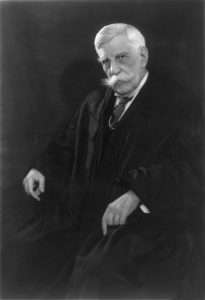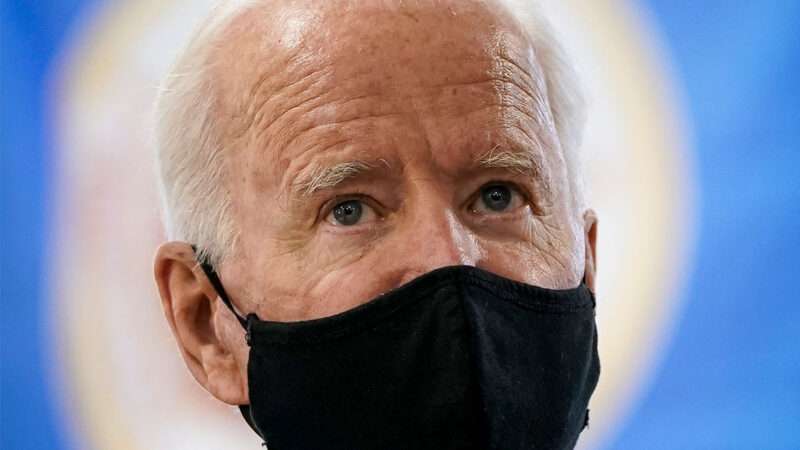1/12/1932: Justice Oliver Wendell Holmes resigns from the Supreme Court.

from Latest – Reason.com https://ift.tt/2LpptVo
via IFTTT
another site
1/12/1932: Justice Oliver Wendell Holmes resigns from the Supreme Court.

from Latest – Reason.com https://ift.tt/2LpptVo
via IFTTT
1/12/1932: Justice Oliver Wendell Holmes resigns from the Supreme Court.

from Latest – Reason.com https://ift.tt/2LpptVo
via IFTTT

“Today, the Trump Administration officially left the Paris Climate Change Agreement,” tweeted President-elect Joe Biden on November 4, 2020. “And in exactly 77 days, a Biden Administration will rejoin it.”
On April 22, 2016—Earth Day—then–President Barack Obama signed the Paris accord, treating it as an executive agreement rather than a treaty requiring Senate approval. Recognizing that unabated man-made climate change would likely become a significant problem for humanity as the century advances, the Paris Agreement aims to limit the increase of global average temperature to less than 2 degrees Celsius above its pre-industrial level. Under the agreement’s provisions, signatories submit their plans, called nationally determined contributions (NDC), to the United Nations. The pledges are voluntary and nonbinding.
Back in 2010, the Obama administration promised to reduce U.S. emissions of greenhouse gases to 17 percent below their 2005 levels within a decade. In 2015, the administration submitted its NDC, committing to a cut of 26–28 percent compared to the same baseline by 2025. Over the longer term, the administration pledged to reduce U.S. emissions by 80 percent from their 2005 levels by 2050. Under Obama’s 2015 Clean Power Plan, emissions from electric power generation were supposed to fall 30 percent by 2025.
President-elect Biden’s $2 trillion plan for a “clean energy revolution and environmental justice” is even more aggressive. By 2035, no electric power would be generated by burning fossil fuels, and the U.S. would commit to zero net emissions of greenhouse gases by 2050.
President Donald Trump issued numerous executive orders to cancel Obama’s climate change programs and regulations. Biden no doubt will issue executive orders to re-establish and expand many of the Obama administration’s top-down, centralized climate programs. These include raising vehicle fuel economy standards, restoring the Clean Power Plan to make deep cuts in emissions from electricity generation, imposing stricter energy efficiency standards on appliances and buildings, and banning fossil fuel production on federal lands.
Where do U.S. emissions of greenhouse gases stand compared to Obama’s pledges? According to a July report by the Rhodium Group consultancy, U.S. emissions have declined by 21 percent from their 2005 baseline. In other words, the U.S. has more than met the Obama administration’s promised reduction goal for 2020. But that decline was largely due to a market-driven shift from coal to natural gas for electricity generation and to the economic disruptions caused by the COVID-19 pandemic, rather than to specific policies aimed at reducing greenhouse gas emissions.
What about Obama’s NDC pledge to cut emissions by 26–28 percent as of 2025? In a scenario where no new policies are adopted and the economy makes a quick post-pandemic recovery, the Rhodium analysts believe U.S. emissions will remain essentially flat at 20 percent below their 2005 levels. If the recovery is slow, the analysts say, U.S. greenhouse emissions in 2025 would be about 27 percent below their 2005 levels. New policies from the Biden administration are a given, however.
The next U.N. climate change meeting was postponed for a year due to the pandemic. It will convene in November 2021 in Glasgow, Scotland. Paris Agreement signatories are supposed to submit more-ambitious NDCs at that meeting. In his climate change plan, Biden aims to “push the rest of the world to raise their ambitions alongside the United States.”
How ambitious will those targets be? The Center for American Progress, a think tank from which the Biden administration probably will draw many staffers, argues that the U.S. should commit to a 2030 goal of cutting its greenhouse gas emissions by 43 percent below their 2005 levels.
from Latest – Reason.com https://ift.tt/3nIK5VS
via IFTTT

“Today, the Trump Administration officially left the Paris Climate Change Agreement,” tweeted President-elect Joe Biden on November 4, 2020. “And in exactly 77 days, a Biden Administration will rejoin it.”
On April 22, 2016—Earth Day—then–President Barack Obama signed the Paris accord, treating it as an executive agreement rather than a treaty requiring Senate approval. Recognizing that unabated man-made climate change would likely become a significant problem for humanity as the century advances, the Paris Agreement aims to limit the increase of global average temperature to less than 2 degrees Celsius above its pre-industrial level. Under the agreement’s provisions, signatories submit their plans, called nationally determined contributions (NDC), to the United Nations. The pledges are voluntary and nonbinding.
Back in 2010, the Obama administration promised to reduce U.S. emissions of greenhouse gases to 17 percent below their 2005 levels within a decade. In 2015, the administration submitted its NDC, committing to a cut of 26–28 percent compared to the same baseline by 2025. Over the longer term, the administration pledged to reduce U.S. emissions by 80 percent from their 2005 levels by 2050. Under Obama’s 2015 Clean Power Plan, emissions from electric power generation were supposed to fall 30 percent by 2025.
President-elect Biden’s $2 trillion plan for a “clean energy revolution and environmental justice” is even more aggressive. By 2035, no electric power would be generated by burning fossil fuels, and the U.S. would commit to zero net emissions of greenhouse gases by 2050.
President Donald Trump issued numerous executive orders to cancel Obama’s climate change programs and regulations. Biden no doubt will issue executive orders to re-establish and expand many of the Obama administration’s top-down, centralized climate programs. These include raising vehicle fuel economy standards, restoring the Clean Power Plan to make deep cuts in emissions from electricity generation, imposing stricter energy efficiency standards on appliances and buildings, and banning fossil fuel production on federal lands.
Where do U.S. emissions of greenhouse gases stand compared to Obama’s pledges? According to a July report by the Rhodium Group consultancy, U.S. emissions have declined by 21 percent from their 2005 baseline. In other words, the U.S. has more than met the Obama administration’s promised reduction goal for 2020. But that decline was largely due to a market-driven shift from coal to natural gas for electricity generation and to the economic disruptions caused by the COVID-19 pandemic, rather than to specific policies aimed at reducing greenhouse gas emissions.
What about Obama’s NDC pledge to cut emissions by 26–28 percent as of 2025? In a scenario where no new policies are adopted and the economy makes a quick post-pandemic recovery, the Rhodium analysts believe U.S. emissions will remain essentially flat at 20 percent below their 2005 levels. If the recovery is slow, the analysts say, U.S. greenhouse emissions in 2025 would be about 27 percent below their 2005 levels. New policies from the Biden administration are a given, however.
The next U.N. climate change meeting was postponed for a year due to the pandemic. It will convene in November 2021 in Glasgow, Scotland. Paris Agreement signatories are supposed to submit more-ambitious NDCs at that meeting. In his climate change plan, Biden aims to “push the rest of the world to raise their ambitions alongside the United States.”
How ambitious will those targets be? The Center for American Progress, a think tank from which the Biden administration probably will draw many staffers, argues that the U.S. should commit to a 2030 goal of cutting its greenhouse gas emissions by 43 percent below their 2005 levels.
from Latest – Reason.com https://ift.tt/3nIK5VS
via IFTTT

In March 2020, the government of Singapore rolled out its TraceTogether cellphone app, which tracks phones to see when two have been close to each other. It promised the app would only be used when someone tested positive for the coronavirus to see whom that person had been close to. The government now says the system is also used for criminal investigations. But officials point out that under Singapore law all privacy regulations can be overruled during criminal investigations. Singapore residents are required to download the app to enter many workplaces and stores.
from Latest – Reason.com https://ift.tt/3i33Gih
via IFTTT

In March 2020, the government of Singapore rolled out its TraceTogether cellphone app, which tracks phones to see when two have been close to each other. It promised the app would only be used when someone tested positive for the coronavirus to see whom that person had been close to. The government now says the system is also used for criminal investigations. But officials point out that under Singapore law all privacy regulations can be overruled during criminal investigations. Singapore residents are required to download the app to enter many workplaces and stores.
from Latest – Reason.com https://ift.tt/3i33Gih
via IFTTT
Peter Huber passed away last week. He was a brilliant thinker, incisive commentator, attorney, and young reader’s biography of the latter. He was an incredibly impressive person.
In City Journal, Mark Mills writes:
Peter Huber, a long-time senior fellow of the Manhattan Institute, a founding partner in a successful Washington, D.C. law firm; a polymath and prolific author of a dozen consequential books and hundreds of essays and op-eds; influential analyst, intellectual powerhouse, and seer in matters from the role of science in the courts, to telecom competition and environmental regulation, as well as energy and health-care policy—all issues of as central importance now as when he first wrote about them—died on January 8 in Hanover, New Hampshire. He was 68. . . .
It was in these City Journal pages some 14 years ago that Peter wrote “Germs and the City,” about the historical, regulatory, and scientific architecture of pandemics. In that essay he warned that “one way or another, germs will contrive to horrify us again, in some very nasty way. A society’s only real defense is to stay horrified, well ahead of the curve.” And he correctly predicted that a cure, a vaccine, would come much faster using the “codes” in both genetic and computational machines, hence the title of the last book in his canon, The Cure in the Code: How 20th Century Law Is Undermining 21st Century Medicine (2013). . . .
A beautiful mind was taken from the world, but his ideas through the legacy of his words will continue to help illuminate our future. . . .
The Manhattan Institute, where Huber was a senior fellow, offers an additional remembrance.
He will be missed.
from Latest – Reason.com https://ift.tt/3oCuVCJ
via IFTTT
Peter Huber passed away last week. He was a brilliant thinker, incisive commentator, attorney, and young reader’s biography of the latter. He was an incredibly impressive person.
In City Journal, Mark Mills writes:
Peter Huber, a long-time senior fellow of the Manhattan Institute, a founding partner in a successful Washington, D.C. law firm; a polymath and prolific author of a dozen consequential books and hundreds of essays and op-eds; influential analyst, intellectual powerhouse, and seer in matters from the role of science in the courts, to telecom competition and environmental regulation, as well as energy and health-care policy—all issues of as central importance now as when he first wrote about them—died on January 8 in Hanover, New Hampshire. He was 68. . . .
It was in these City Journal pages some 14 years ago that Peter wrote “Germs and the City,” about the historical, regulatory, and scientific architecture of pandemics. In that essay he warned that “one way or another, germs will contrive to horrify us again, in some very nasty way. A society’s only real defense is to stay horrified, well ahead of the curve.” And he correctly predicted that a cure, a vaccine, would come much faster using the “codes” in both genetic and computational machines, hence the title of the last book in his canon, The Cure in the Code: How 20th Century Law Is Undermining 21st Century Medicine (2013). . . .
A beautiful mind was taken from the world, but his ideas through the legacy of his words will continue to help illuminate our future. . . .
The Manhattan Institute, where Huber was a senior fellow, offers an additional remembrance.
He will be missed.
from Latest – Reason.com https://ift.tt/3oCuVCJ
via IFTTT
From an official Facebook post:
We began preparing for Inauguration Day last year. But our planning took on new urgency after last week’s violence in Washington, D.C., and we are treating the next two weeks as a major civic event. We’re taking additional steps and using the same teams and technologies we used during the general election to stop misinformation and content that could incite further violence during these next few weeks.
We are now removing content containing the phrase “stop the steal” under our Coordinating Harm policy from Facebook and Instagram. We removed the original Stop the Steal group in November and have continued to remove Pages, groups and events that violate any of our policies, including calls for violence. We’ve been allowing robust conversations related to the election outcome and that will continue. But with continued attempts to organize events against the outcome of the US presidential election that can lead to violence, and use of the term by those involved in Wednesday’s violence in DC, we’re taking this additional step in the lead up to the inauguration. It may take some time to scale up our enforcement of this new step but we have already removed a significant number of posts….
There’s nothing illegal about Facebook doing this. But there seems every likelihood that there will be much more happening along these lines. And, with the Parler story, we see that major tech players are going to try to blacklist any new platforms that fail to comply with the tech players’ speech restriction demands.
As I mention in my N.Y. Times piece,
In general, it’s good for private businesses to be able to decide how to use their property. And trying to create laws constraining those decisions may well do more harm than good — always a danger with even the best-intentioned of new laws. Yet both liberals and conservatives should appreciate the perils of power, especially the power of enormous companies that have few competitors and huge influence over political life.
from Latest – Reason.com https://ift.tt/2K6tqxv
via IFTTT
From an official Facebook post:
We began preparing for Inauguration Day last year. But our planning took on new urgency after last week’s violence in Washington, D.C., and we are treating the next two weeks as a major civic event. We’re taking additional steps and using the same teams and technologies we used during the general election to stop misinformation and content that could incite further violence during these next few weeks.
We are now removing content containing the phrase “stop the steal” under our Coordinating Harm policy from Facebook and Instagram. We removed the original Stop the Steal group in November and have continued to remove Pages, groups and events that violate any of our policies, including calls for violence. We’ve been allowing robust conversations related to the election outcome and that will continue. But with continued attempts to organize events against the outcome of the US presidential election that can lead to violence, and use of the term by those involved in Wednesday’s violence in DC, we’re taking this additional step in the lead up to the inauguration. It may take some time to scale up our enforcement of this new step but we have already removed a significant number of posts….
There’s nothing illegal about Facebook doing this. But there seems every likelihood that there will be much more happening along these lines. And, with the Parler story, we see that major tech players are going to try to blacklist any new platforms that fail to comply with the tech players’ speech restriction demands.
As I mention in my N.Y. Times piece,
In general, it’s good for private businesses to be able to decide how to use their property. And trying to create laws constraining those decisions may well do more harm than good — always a danger with even the best-intentioned of new laws. Yet both liberals and conservatives should appreciate the perils of power, especially the power of enormous companies that have few competitors and huge influence over political life.
from Latest – Reason.com https://ift.tt/2K6tqxv
via IFTTT